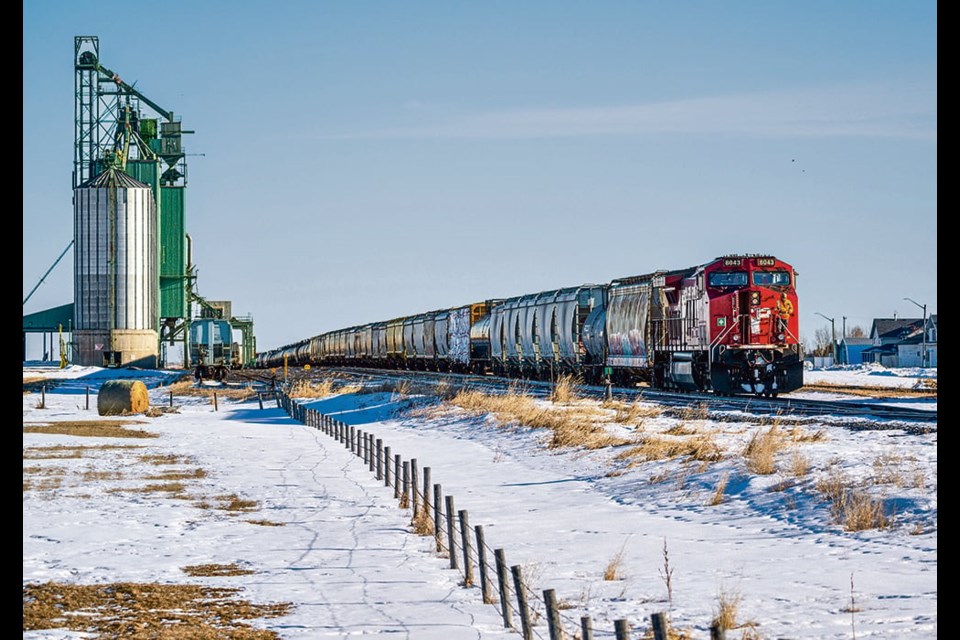WESTERN PRODUCER — Shipments of grains and oilseeds continue to move briskly through west coast export terminals, thanks to mild winter weather and steady deliveries by Canada’s major railway companies.
“Things have been going pretty smoothly, knock on wood,” said Mark Hemmes, president of Quorum Corp., the company that monitors Canada’s prairie grain-handling and transportation system on behalf of the federal government.
“There have been a few little things that… are causing some issues, but we haven’t had any floods, we haven’t had any fires, and we haven’t had any major derailments or line outages.”
Hemmes said the 2022-23 shipping season is shaping up to be a “banner year,” barring unexpected disruptions over the next five months.
After 28 weeks in the current marketing year — just a little past the halfway mark — nearly 200,000 car loads of grains and oilseeds have been unloaded at British Columbia ports in Vancouver and Prince Rupert, according to grain monitoring program statistics.
By comparison, fewer than 124,000 car loads had been unloaded at the same time last year. The three-year average after Week 28 is around 178,000 car loads.
In terms of the grain volume leaving those export terminals, Vancouver and Prince Rupert are 67 percent ahead of last year’s pace and 13 percent ahead of the three-year average, Quorum data shows.
After 28 weeks, total outbound shipments from west coast terminals exceeded 19.1 million tonnes, up from 11.5 million tonnes in 2021-22.
“As of the end of Week 28, the shipments are looking really good,” Hemmes said.
“It wouldn’t take much to beat last year… but we’re nine percent higher than the three-year average overall and 13 percent higher on the West Coast.
“Across the board, both railways are doing really good deliveries to the ports.”
Wade Sobkowich, executive director of the Western Grain Elevators Association (WGEA), said railway performance by Canada’s two major railways has been adequate, but below expectations.
“Rail service has been acceptable from the grain companies’ point of view,” Sobkowich said.
“We’ve seen car order fulfilment levels in the 70 and 80 percentiles. That’s lower than what we’ve identified as a threshold (for acceptable service) for us, but we’ve grown accustomed to anticipating a drop in car order fulfilment (in the winter)… and when the temperature drops below -25 C.”
Sobkowich said grain companies represented by the WGEA are not seeing any “identifiable issues” affecting rail service.
Hemmes said rain on the West Coast delayed ship-loading operations, particularly in January and February.
“We’ve had a couple of instances out on the West Coast where we were getting extraordinarily long periods of rain…,” he said.
“The vessel lineup in port is a little bit high this year but you expect it to be a little bit higher than normal when you have these kinds of volumes running through.”
As of Feb. 19, 33 ships were in the queue for west coast grain, including 23 at Vancouver, six at Vancouver Island and four at Prince Rupert.
Vancouver has had a wet winter, with ship-loading operations delayed for two to three days at a time on several occasions.
In Prince Rupert, meanwhile, rainfall totals have been well above normal since Jan. 1.
In an average year, Prince Rupert expects to receive between 200 and 250 millimetres of precipitation per month in both January and February.
This year, as of Feb. 21, total precipitation in Prince Rupert was nearing 640 mm.
“They (Prince Rupert) are getting almost twice as much rain this year than they would on an average year,” Hemmes said.
“That messes with the system because you can’t load vessels if it’s always raining. So it backs up the system.”
Year-to-date in the 2022-23 crop year, total grain shipments through the port of Thunder Bay, Ont., were down slightly at 3.74 million tonnes after Week 28, compared with Thunder Bay’s three-year average of 3.99 million tonnes.
Total export shipments through Vancouver, Prince Rupert and Thunder Bay as of mid-February were listed at 22.86 million tonnes.

